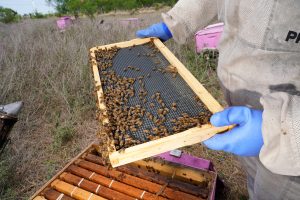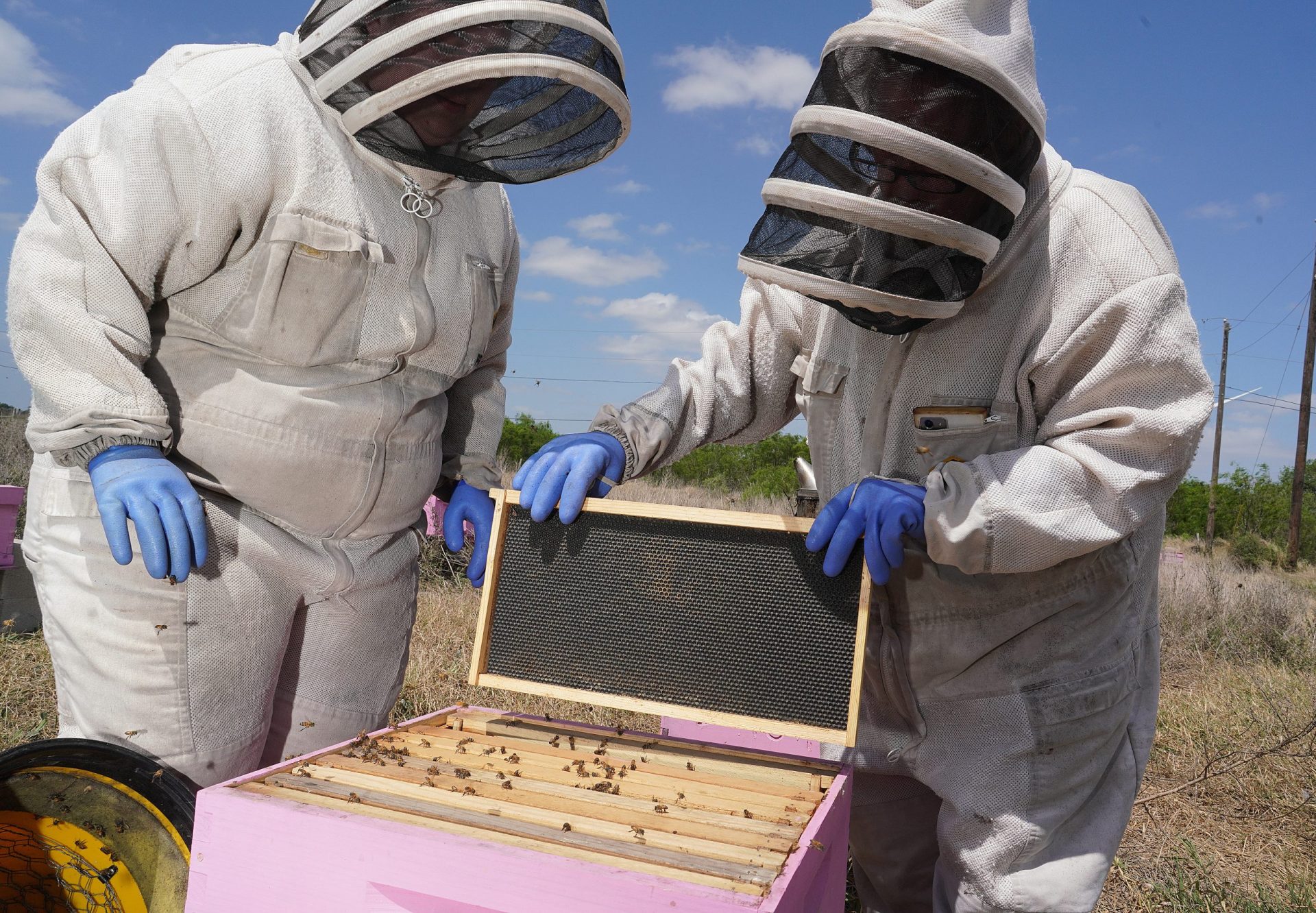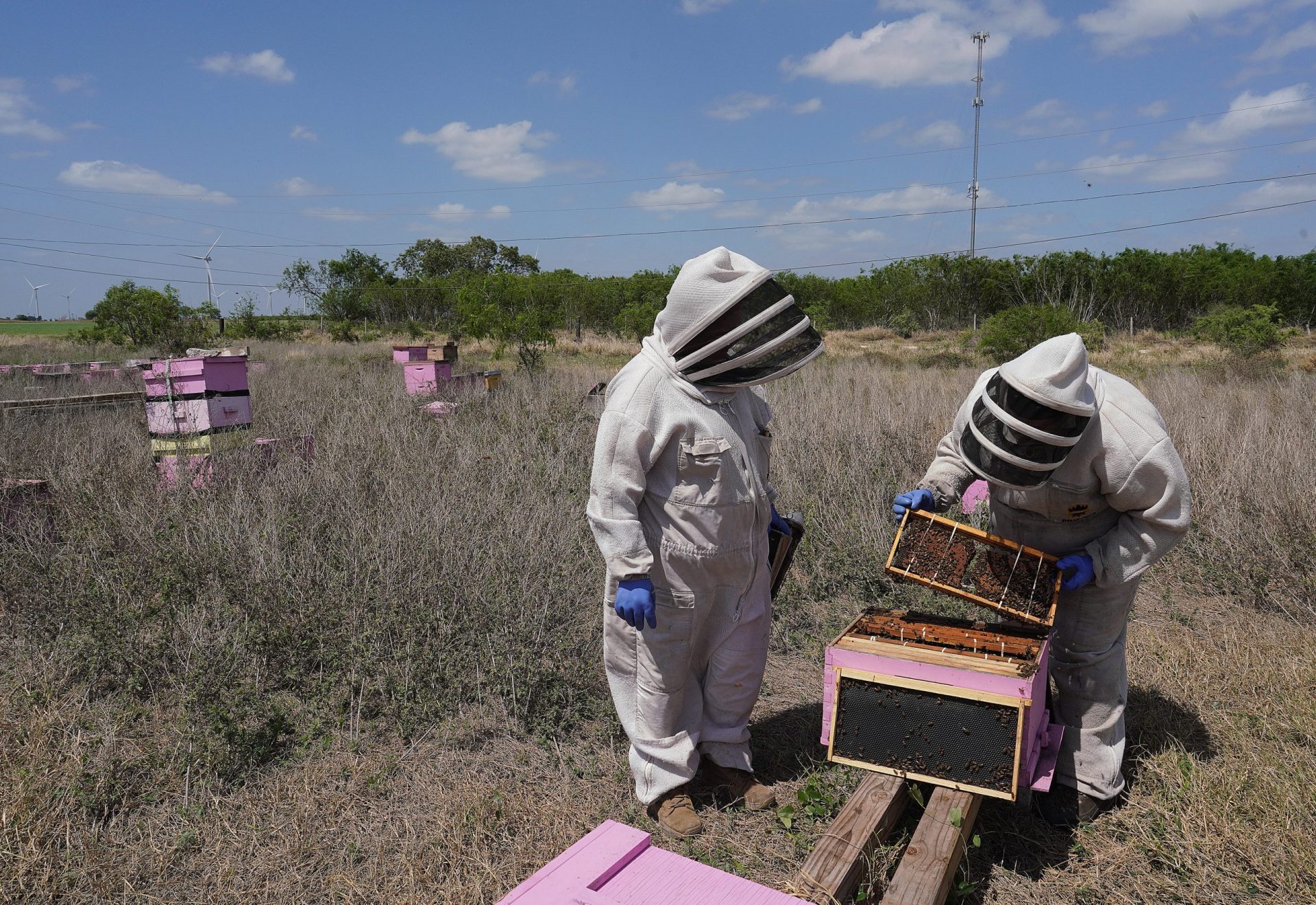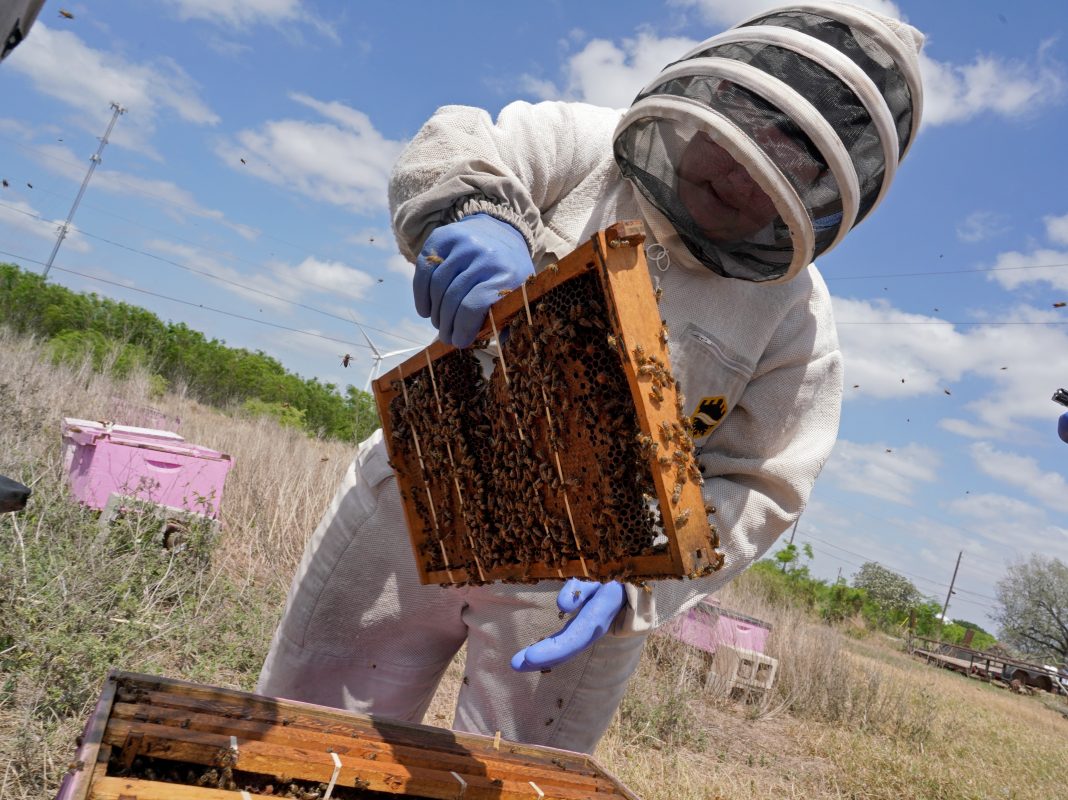Our mission is to educate people about the safety. You can have bees in an area and still be safe, and then remove them and relocate them. If I remove them and bring them here, they’re not a danger to somebody else. We use them for farms, watermelon, things like that, honey production.

LYFORD — Devin Johnston grabbed a handful of apple wood chips and placed them inside the fire chamber of the bee smoker on the tailgate of a truck.
After she lit the chips, she closed the smoker and began squeezing the accordion-like billow, pumping dirty white smoke out of the nozzle that was quickly intercepted by the intense wind Wednesday afternoon.
The apiary sits amid vast green fields, mesquite trees and wind turbines. The otherwise rural quiet was only disturbed by the constant honking of geese and the occasional crow of a rooster that congregated on the grounds of R9 Hive & Honey.
“I didn’t have a guardian dog at one time, and geese are good for keeping the critters away,” Dawn Johnston said, as she applied Gorilla Tape to the sleeves and legging portions of the white, dirt-stained ProVent bee suits that she and her daughter wore.
Dawn and Devin Johnston are the mother-daughter tandem who own and operate R9 Hive & Honey. Together, they respond to calls for bee removals throughout the entire Rio Grande Valley, and sometimes as far as Corpus Christi.
“I get stung almost every day of my life,” Devin said as she prepared the smoker. “If I’m not working with bees, I get stung almost every time. I’ve finally gotten over it. It only took like three years for me to get over it.”
With the smoker ready and their bee suits safely secured, the two women took a large orange bucket filled with honey bees to one of the hundred pink hive boxes spread out throughout the yard behind Dawn’s home.
The bees came from a bee removal they’d been called to Tuesday at a school in McAllen.
“It was on their playground, and of course they were worried because they have children,” Dawn said. “They don’t want bees there. So they called me and after school was over, I went over and I vacuumed them up and brought them home and put them in a box.”
They were able to safely remove a hive of roughly a thousand bees, a relatively small amount according to Dawn.

Dawn has been taking calls to remove bees from commercial and residential buildings since 2018. She has since recruited her daughter to help her with the fairly new family business.
“I always tell people that I love the bees when I’m talking about the bees, but when I’m working with the bees, we definitely have a little bit of a love-hate relationship,” Devin said. “No, let’s be real, it’s a little bit of a hate-hate relationship. I don’t like having to disturb them. They don’t like me having to disturb them. But, ya know, I still love bees.”
The women approached an empty “flower power pink” colored box and removed the lid, revealing ten frames with black beeswax shaped like honeycomb. Each side of the frame has 2,500 cells for the bees to begin adding their own wax and molding new hives.
Dawn pumped smoke as the lid of the bucket was gently removed, showing a swarm of festooning bees clutching to the lid.
“This is their most gentle time because right now they’re not defending anything, they’re just kind of confused,” Devin said while delicately placing the ball of bees onto their new hive.
“If you see these, avoid them, if they’re on your property,” Dawn said. “If they’re sort of like this, they’re going to be calm and they’re probably going to move on. It’s very rare that they want to create their nest in a tree itself. It is a possibility however, which is why we do suggest that you call … a beekeeper.”
No, let’s be real, it’s a little bit of a hate-hate relationship. I don’t like having to disturb them. They don’t like me having to disturb them. But, ya know, I still love bees.
Dawn began beekeeping by accident. Initially, she wanted to have a few hives to help supplement her garden. She asked a friend to mentor her and teach her how to safely remove and care for bees.
“I went out with him for an hour and he says, ‘Let’s go to lunch,’” Dawn recalled. “I’m like, OK, he goes, ‘Buy my business.’ What? I had been in the bees a whole one hour in a suit. He’s 85 at the time, so he was getting too old to pick up the hives. It’s been five years now.”
What started out as a hobby has grown into a passionate effort to not only save bee populations, but to also educate the uninformed about bee safety.
“Our mission is to educate people about the safety,” she said. “You can have bees in an area and still be safe, and then remove them and relocate them. If I remove them and bring them here, they’re not a danger to somebody else. We use them for farms, watermelon, things like that, honey production.”
More recently, the beekeepers made headlines when they were called to a residential area in McAllen to remove a hive of Africanized bees after they attacked and killed two dogs.
There’s no shortage of bees in the region. The subtropical climate and plant life provide the perfect environment for bees to thrive in. She said that for the Valley, it’s “bee season” ten months out of the year.
“That being said, I fell out of a tree in December getting a swarm of bees out of a tree the day after Christmas,” Dawn said with a laugh. “I ended up breaking four ribs, but that’s besides the point. Because we are so warm in the Valley, that’s why the Africanized bee does so well down where we are because it’s so warm and mild.”

The duo emphasized educating one’s-self about bees and what to do when they are encountered. They make regular speaking engagements for municipalities and other various organizations. She said that if bees are discovered in a residence or public area, it’s best to call an exterminator or any local beekeeper.
She also suggested bee-proofing your home, adding that it only takes a pinky-sized hole for bees to begin building a hive.
“If you can put your pinky in something, seal it,” Dawn said. “Silicone caulking or mortar, no spray foam. Spray foam is not your friend.”
As the women added the last few hundred bees to the wooden frames, some of the bees appeared to take to their new home.
“They’re happy,” Dawn pointed out. “See when they have their butts in the air? They’re fanning a come-hither scent. They mean, ‘OK, everybody, come on. We’re gonna go here now.’ They’re telling everybody to follow.”
Dawn said that the goal is to eventually have 1,500 hives and begin mentoring others interested in beekeeping.
“I wouldn’t mind teaching other people what we do,” Dawn said. “Because there are so many people in the Valley, I don’t mind if they start their own company and move off and get a job doing this. You have to have room to put the bees, you can’t do this in town, and you have to have, I guess, the fortitude to get stung to deal with the crankies.”
Both women hope their passion and encyclopedic knowledge for the bees is something that they can share with those throughout the Rio Grande Valley.
“As much as we like working with the bees, we both are really passionate about educating people about bees, especially when it comes to bee-proofing your house and bee safety,” Devin said.
“I always say if you guys put me out of business because everybody in the valley knows how to bee-proof their house, then hallelujah,” she continued. “Then I can just play with the bees, you know. I would rather people just be safe and not have bees in their homes. Just be safe.”
For more information about R9 Hive & Honey, visit their website, www.r9hiveandhoney.com, or their Facebook and Instagram pages. They can also be contacted by calling (956) 746-1799 or by sending an email to [email protected].
Editor’s note: This story was updated for clarity about the nozzle, and Dawn’s friend who mentored her.
To see more, view Monitor photojournalist Joel Martinez’s full photo gallery here:
RELATED READING:
Expert: Slow down, scope out yard first to avoid bee attacks





